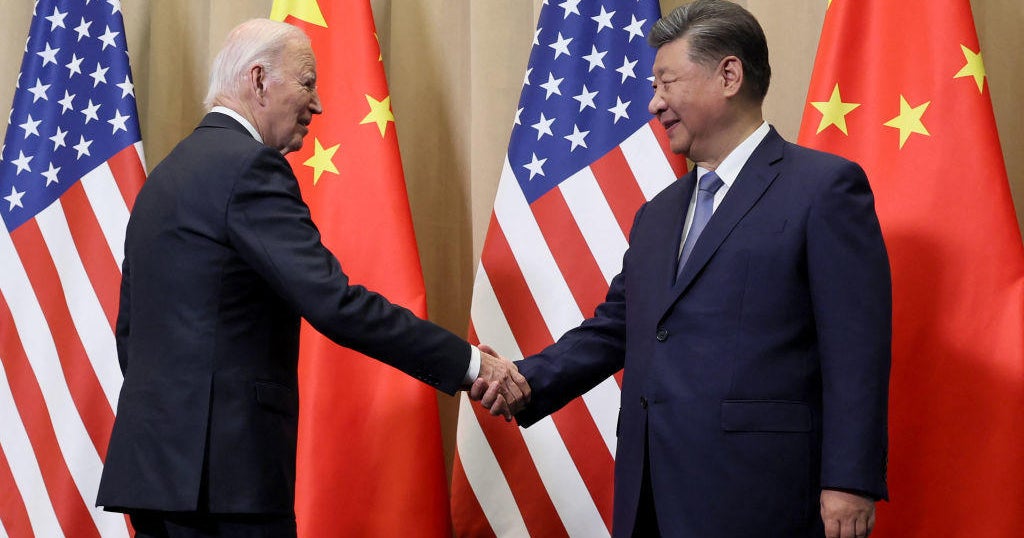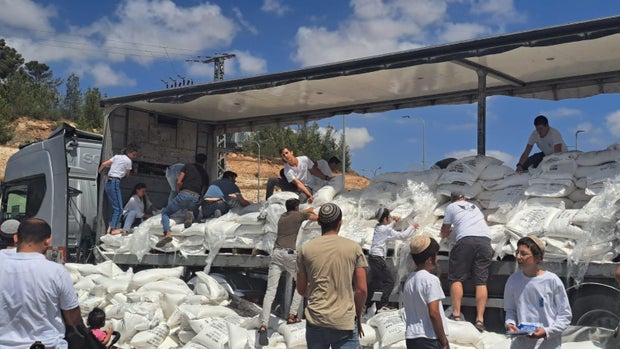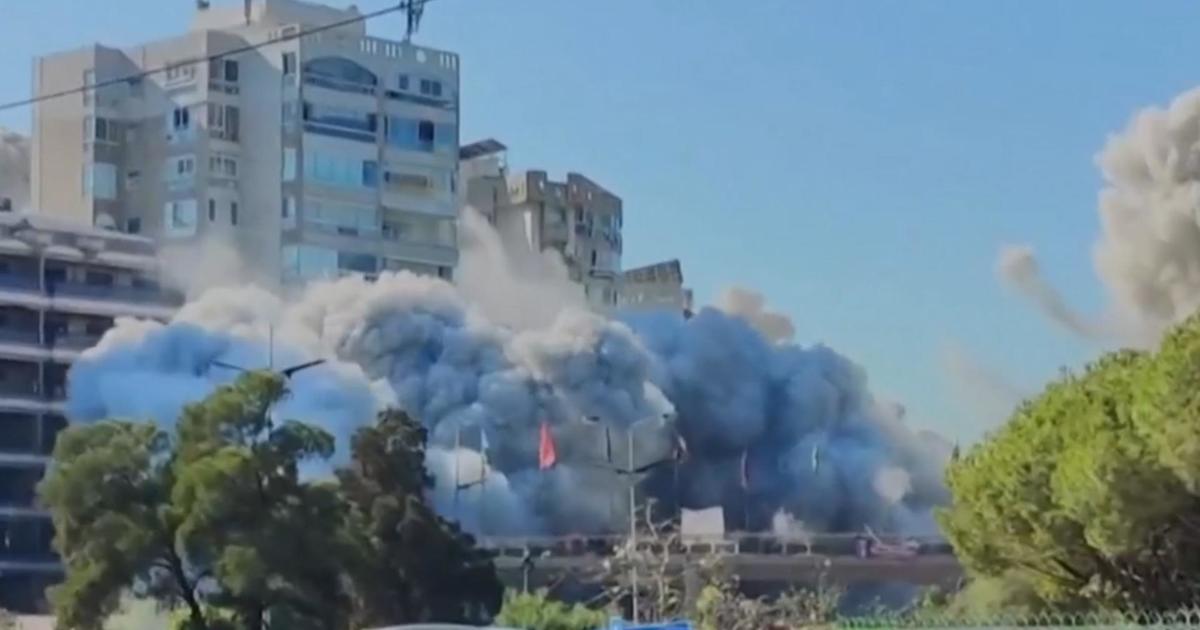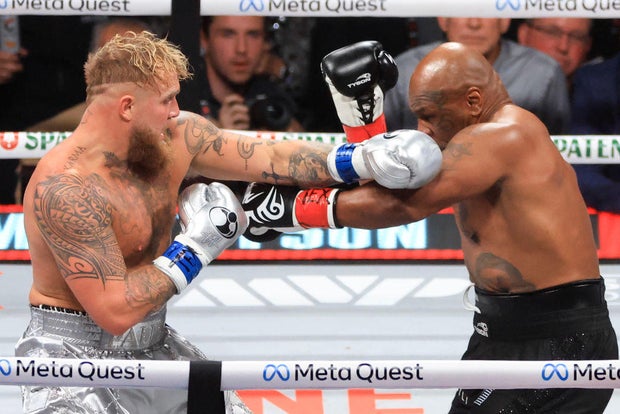CBS News
Inside right-wing Israeli attacks on Gaza aid convoys, who’s behind them, and who’s suffering from them

Jerusalem — For months, images of Jewish settlers and right-wing extremists attacking aid convoys destined for Gaza have drawn global outrage. Widely circulated on social media, photos and videos have shown far-right Israeli activists blocking aid trucks from entering crossings into the war-torn Palestinian territory, looting the vans and throwing aid to the ground.
The attacks have drawn the ire of the White House, with U.S. National Security Advisor Jake Sullivan telling reporters last month it was “a total outrage that there are people who are attacking and looting these convoys coming from Jordan and going to Gaza to deliver humanitarian assistance.”
“We are looking at the tools that we have to respond to this,” Sullivan said. “We are also raising our concerns at the highest level of the Israeli government and it’s something that we make no bones about — this is completely and utterly unacceptable behavior.”
It’s not just the aid that’s been attacked. There’s also been physical violence.
In video shared with CBS News, Palestinian truck driver Mohsen Shaheen can be seen lying bloodied on the ground next to his vehicle. He says he was beaten by a group of settlers who had wrongly assumed he was hauling aid to Gaza.
“The window to my truck was open and a settler came and sprayed me with pepper spray,” Shaheen told CBS News. “Then there was a rock or iron bar smashing the other window. It hit me in the face. Blood was everywhere… I thought I was going to die.”
Shaheen said Israeli soldiers at the scene did little to assist him.
Last month, Sapir Sluzker Amran, an Israeli peace activist who witnessed an attack by right-wing activists on an aid truck in the occupied West Bank, told CBS News a similar story.
Amran said one member of the far-right group slapped her as she tried to stop the attack on the aid trucks, and that Israel Defense Forces personnel at the scene refused to help her.
Amran also said the right-wing extremists were often tipped off about humanitarian aid convoys by Israeli military and police officials.
“They know, so they have information beforehand about when the trucks are coming, and they publish it on social media and they publish it on their groups, WhatsApp groups, and asking people to join and block or damage the aid,” she said.
Adv. Sapir Sluzker Amran, Co- director of Breaking Walls movment
CBS News gained access to a WhatsApp group used by one such group called “we won’t forget.”
It cataloged in detail how many trucks would be in a convoy, what routes they would travel on, and the crossings they moved through on any given day.
In one message, a member of the chat appeared to explain where the information was coming from. “Methods for Blocking Acts: We get preliminary info from border crossing workers, police and soldiers,” the WhatsApp message read.
CBS News reached out to Israel’s security forces for comment on the allegations that some members have tipped off far-right groups who’ve blocked aid, or not intervened when convoys were attacked. The Israeli military referred CBS News to Israeli police authorities, who said in a statement that, “to the best of its knowledge,” the claims were “baseless” and “unfounded rumors.”
Another message made reference to Bezalel Smotrich, Israel’s ultranationalist Finance Minister.
“For those who ask, the following information came from Minister Smotrich who wrote to the Prime Minister and asked him how come he approved aid to Gaza,” the text read.
GIL COHEN-MAGEN/AFP/Getty
Smotrich, an influential figure in Prime Minister Benjamin Netanyahu’s cabinet, used his position to block a U.S.-funded flour shipment to Gaza in February, after making an unfounded claim that the flour, which was being transferred to the United Nations, would go to Hamas.
CBS News sought comment from Smotrich on the claims that he has assisted the extremist groups. The query was met with a firm denial by the finance minister’s office.
Withholding humanitarian aid from Gaza is not an entirely fringe view in Israel. A March poll from Shiluv I2R, a leading Israeli survey and research firm, found 44% of Israelis believe the country “should make aid conditional on a hostage release deal.”
22% said no aid should be provided until the war was over.
Yosef de Bresser is among those who don’t want aid to get into Gaza. A key organizer behind the blockade movement, he told CBS News he’d been detained 12 times for obstructing supplies to Gaza but, so far, had yet to be charged.
“In every war there is someone who loses and someone who wins,” he said when asked why he thought it was right to block humanitarian assistance for Gazans. “Either the people in Gaza will die, either the people in Israel will die… It’s black and white.”
After nearly nine months of devastating violence and destruction, aid agencies say the amount of aid reaching desperate Palestinians in Gaza is still woefully insufficient.
While the settlers and activist groups’ attempts to block those supplies only have a limited impact, aid agencies say the real obstruction comes from the Israeli government.
Multiple agencies say Israel routinely and arbitrarily prevents legitimate humanitarian goods from entering Gaza through a highly complicated inspection and approval process and without clear or consistent instructions.
The U.N. says 1.1 million people — nearly half the population in Gaza — now face catastrophic levels of hunger, and that the territory is on the brink of famine.
Shaheen Mohsen says he hasn’t been able to work since he was attacked, and he doesn’t believe he’ll receive any justice.
“I don’t expect justice. The whole world sees that there is no justice,” he said.
CBS News
Mike Tyson says he has “no regrets” after losing boxing match to Jake Paul

Despite losing his boxing match to Jake Paul, Mike Tyson in a social media post Saturday said he had “no regrets” to getting “in ring one last time.”
The boxing legend was defeated by social media star Jake Paul in a highly anticipated fight on Friday night with an age difference of over three decades between the two contenders.
Netflix said Saturday that 60 million households worldwide tuned in to watch the match. The two fighters went eight full rounds, with each round two minutes long. Paul defeated Tyson by unanimous decision and the 27-year-old upset boxer and 58-year-old former heavyweight champion hugged afterward.
Paul was expected to earn about $40 million from the fight, and Tyson was expected to take around $20 million for the fight, according to DraftKings and other online reports.
Getty Images
Tyson said on his social media that “this is one of those situations when you lost but still won. I’m grateful for last night.”
The fight almost didn’t happen after Tyson experienced an ulcer flare-up while on a plane in March. He addressed his illness Saturday, writing that he “almost died in June.” He said he had eight blood transfusions and “lost half my blood and 25lbs in hospital and had to fight to get healthy to fight so I won.”
Tyson retired from boxing in 2005 after a 20-year career. He last fought in a 2020 exhibition match against former four-division world champ Roy Jones Jr.
“To have my children see me stand toe to toe and finish 8 rounds with a talented fighter half my age in front of a packed Dallas Cowboy stadium is an experience that no man has the right to ask for. Thank you,” he said.
Alex Sundby and
contributed to this report.
CBS News
In their final meeting, Xi tells Biden he is “ready to work with a new administration”

In their final meeting, China’s leader Xi Jinping told U.S. President Biden that his nation was “ready to work with a new administration,” as President-elect Donald Trump prepares to take over.
The two leaders gathered Saturday on the sidelines of the annual Asia-Pacific Economic Cooperation summit. Mr. Biden was expected to urge Xi to dissuade North Korea from further deepening its support for Russia’s war on Ukraine. It marked their first in-person meeting since they met in Northern California last November.
Without mentioning Trump’s name, Xi appeared to signal his concern that the incoming president’s protectionist rhetoric on the campaign trail could send the U.S.-China relationship into another valley.
“China is ready to work with a new U.S. administration to maintain communication, expand cooperation and manage differences so as to strive for a steady transition of the China-U.S. relationship for the benefit of the two peoples,” Xi said through an interpreter.
LEAH MILLIS/POOL/AFP via Getty Images
Mr. Biden, meanwhile, spoke in broader brushstrokes about where the relationship has gone and reflected not just on the past four years, but on their long relationship.
“Over the past four years, China-U.S. relations have experienced ups and downs, but with the two of us at the helm, we have also engaged in fruitful dialogues and cooperation, and generally achieved stability,” he said.
Mr. Biden and Xi, with top aides surrounding them, gathered around a long rectangle of tables in an expansive conference room at Lima’s Defines Hotel and Conference Center.
There’s much uncertainty about what lies ahead in the U.S.-China relationship under Trump, who campaigned promising to levy 60% tariffs on Chinese imports.
Bobby Djavaheri, president of Los Angeles-based Yedi Houseware Appliances — which manufactures its products in China — told CBS News in an interview this week that such tariffs “would decimate our business, but not only our business. It would decimate all small businesses that rely on importing.”
Trump has also proposed revoking China’s Most Favored Nation trade status, phasing out all imports of essential goods from China and banning China from buying U.S. farmland.
Already, many American companies, including Nike and eyewear retailer Warby Parker, have been diversifying their sourcing away from China. Shoe brand Steve Madden says it plans to cut imports from China by as much as 45% next year.
White House national security adviser Jake Sullivan said Biden administration officials will advise the Trump team that managing the intense competition with Beijing will likely be the most significant foreign policy challenge they will face.
It’s a big moment for Mr. Biden as he wraps up more than 50 years in politics. He saw his relationship with Xi as among the most consequential on the international stage and put much effort into cultivating that relationship.
Mr. Biden and Xi first got to know each other on travels across the U.S. and China when both were vice presidents, interactions that both have said left a lasting impression.
“For over a decade, you and I have spent many hours together, both here and in China and in between. And I think we’ve spent a long time dealing with these issues,” Mr. Biden said Saturday.
But the last four years have presented a steady stream of difficult moments.
The FBI this week offered new details of a federal investigation into Chinese government efforts to hack into U.S. telecommunications networks. The initial findings have revealed a “broad and significant” cyberespionage campaign aimed at stealing information from Americans who work in government and politics.
U.S. intelligence officials also have assessed China has surged sales to Russia of machine tools, microelectronics and other technology that Moscow is using to produce missiles, tanks, aircraft and other weaponry for use in its war against Ukraine.
And tensions flared last year after Mr. Biden ordered the shooting down of a Chinese spy balloon that traversed the United States.
CBS News
Trump selects Liberty Energy CEO Chris Wright as secretary of Energy

President-elect Donald Trump has selected Chris Wright, a campaign donor and fossil fuel executive, to serve as energy secretary in his upcoming, second administration.
CEO of Denver-based Liberty Energy, Wright is a vocal advocate of oil and gas development, including fracking, a key pillar of Trump’s quest to achieve U.S. “energy dominance” in the global market.
Trump also said in a statement Saturday that Wright will serve on the newly-created National Energy Council, which will be chaired by North Dakota Gov. Doug Burgum, Trump’s selection for secretary of the Interior.
Burgum will oversee a panel that crosses all executive branch agencies involved in energy permitting, production, generation, distribution, regulation and transportation, Trump said in a previous statement.
Wright has been one of the industry’s loudest voices against efforts to fight climate change and could give fossil fuels a boost, including quick action to end a year-long pause on natural gas export approvals by the Biden administration.
Wright also has criticized what he calls a “top-down” approach to climate by liberal and left-wing groups and said the climate movement around the world is “collapsing under its own weight.”
Consideration of Wright to head the administration’s energy department won support from influential conservatives, including oil and gas tycoon Harold Hamm.
Hamm, executive chairman of Oklahoma-based Continental Resources, a major shale oil company, is a longtime Trump supporter and adviser who played a key role on energy issues in Trump’s first term.
Hamm helped organize an event at Trump’s Mar-a-Lago resort in April where Trump reportedly asked industry leaders and lobbyists to donate $1 billion to Trump’s campaign, with the expectation that Trump would curtail environmental regulations if re-elected.
The Energy Department is responsible for advancing energy, environmental and nuclear security of the United States. The agency is in charge of maintaining the country’s nuclear weapons, oversees 17 national research laboratories and approves natural gas exports, as well as ensuring environmental cleanup of the nation’s nuclear weapons complex. It also promotes scientific and technological research.
Republican Sen. John Barrasso, who is expected to become chairman of the Senate Energy and Natural Resources Committee, said Trump promised bold choices for his Cabinet, and Wright’s nomination delivers.
“He’s s an energy innovator who laid the foundation for America’s fracking boom. After four years of America last energy policy, our country is desperate for a secretary (of energy) who understands how important American energy is to our economy and our national security,″ Barrasso said of Wright, adding: “Wright will help ensure America remains committed to an all-of-the-above energy policy that puts American families first.”
Thomas Pyle, president of the American Energy Alliance, a conservative group that supports fossil fuels, said Wright would be “an excellent choice” for Energy secretary. Pyle led Trump’s Energy Department’s transition team in 2016.
Liberty is a major energy industry service provider, with a focus on technology. Wright, who grew up in Colorado, earned undergraduate degree at MIT and did graduate work in electrical engineering at the University of California-Berkeley and MIT. In 1992, he founded Pinnacle Technologies, which helped launch commercial shale gas production through hydraulic fracturing, or fracking.
He later served as chairman of Stroud Energy, an early shale gas producer, before founding Liberty Resources in 2010.















